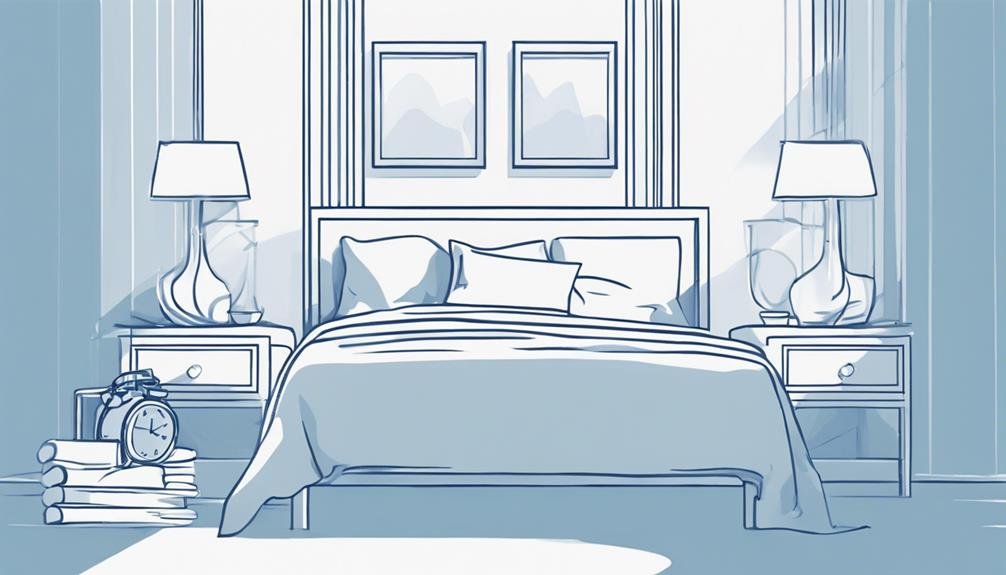5 Nighttime Routines Influencing Men's Hormonal Health
To boost your hormonal health, focus on five key nighttime routines. First, establish a consistent sleep schedule for better hormone production. Next, limit screen time an hour before bed to enhance melatonin levels. Create a relaxing sleep environment by keeping your bedroom dark, cool, and quiet. Incorporating evening exercise can uplift your mood and regulate hormones, but don't workout too close to bedtime. Finally, practice mindfulness techniques like deep breathing to lower stress and improve sleep quality. These simple habits can transform your nightly routine, leading to better hormonal balance and overall well-being. You'll discover even more effective tips ahead.
Key Takeaways
- Maintain a consistent sleep schedule to enhance sleep quality and hormone production, aiming for 7 to 9 hours of rest nightly.
- Limit screen time at least one hour before bed to prevent blue light from disrupting melatonin production and sleep onset.
- Create a relaxing sleep environment by ensuring your bedroom is dark, cool, and quiet, using blackout curtains and white noise machines.
- Incorporate evening exercise a few hours before bedtime to boost mood and hormonal balance without interfering with sleep.
Establishing a Consistent Sleep Schedule
Establishing a consistent sleep schedule is essential for optimizing your hormonal health and overall well-being.
When you go to bed and wake up at the same time each day, you help regulate your body's internal clock, promoting better sleep quality. This consistency allows your body to produce hormones like testosterone and cortisol more effectively.
Aim for seven to nine hours of sleep each night, adjusting your routine to meet this goal. If you're struggling to fall asleep, try winding down with calming activities, like reading or meditating.
Limiting Screen Time Before Bed

Limiting your screen time before bed can greatly enhance your sleep quality and support hormonal health.
The blue light emitted by phones, tablets, and computers interferes with melatonin production, making it harder for you to fall asleep.
Try setting a cut-off time, ideally an hour before bed, to disconnect from screens. Instead, consider engaging in activities like reading a book or practicing relaxation techniques.
You'll find that reducing screen exposure helps signal to your body that it's time to wind down.
Additionally, this practice can lead to deeper sleep cycles, which are essential for testosterone production and overall well-being.
Prioritizing your evening routine without screens can remarkably improve your hormonal balance and daytime energy levels.
Creating a Relaxing Sleep Environment
A calming sleep environment can greatly enhance your ability to relax and promote better hormonal health.
Start by keeping your bedroom dark, cool, and quiet. Use blackout curtains to block out unwanted light and consider a white noise machine or earplugs to minimize disruptive sounds.
Your mattress and pillows should be comfortable and supportive, so invest in quality bedding that suits your preferences.
Additionally, remove clutter and distractions from your space; a tidy room fosters a peaceful mindset.
Incorporate calming scents like lavender or chamomile through candles or essential oils, as they can help signal your body that it's time to wind down.
Incorporating Evening Exercise

Incorporating evening exercise into your routine can considerably boost your mood and support hormonal balance. Engaging in physical activity after work helps release endorphins, which elevate your spirits and reduce stress.
Whether you prefer a brisk walk, a workout at the gym, or a home exercise routine, finding what you enjoy makes it easier to stick with it. Aim for at least 30 minutes of moderate exercise a few times a week.
Just be mindful of timing; exercising too close to bedtime might interfere with your sleep quality. Instead, try to finish your workout at least a couple of hours before winding down for the night. This way, you'll reap the benefits without compromising your sleep.
Mindfulness and Stress Reduction Techniques
Practicing mindfulness and stress reduction techniques can greatly enhance your hormonal health and overall well-being.
By incorporating mindfulness into your nighttime routine, you can effectively lower cortisol levels, which helps balance testosterone. Simple practices like deep breathing, meditation, or even guided imagery can ground you and promote relaxation.
Set aside a few minutes each evening to focus on your breath or engage in progressive muscle relaxation. You'll find that reducing stress not only improves your mood but also supports your body's hormonal functions.
Establishing this routine can lead to deeper sleep and better recovery, which are essential for maintaining hormonal balance.
Questions
How Does Poor Sleep Affect Testosterone Levels in Men?
Poor sleep disrupts your body's natural processes, leading to decreased testosterone production. When you don't get enough rest, your hormone levels can drop, affecting energy, mood, and overall health. Prioritize quality sleep for ideal hormone balance.
What Foods Should Be Avoided at Night for Hormonal Health?
Think of your body as a finely tuned engine; certain foods, like sugary snacks or heavy meals, can clog the gears. Avoid these at night, and you'll keep your hormonal health running smoothly.
Can Naps During the Day Disrupt Nighttime Hormone Balance?
Yes, naps can disrupt your nighttime hormone balance. If you nap too long or too late in the day, it might interfere with your sleep cycle, affecting hormonal regulation and overall health.
Are Sleep Supplements Beneficial for Men's Hormonal Health?
Imagine a garden thriving with vibrant blooms; sleep supplements can nurture your hormonal health. They may enhance your rest, helping regulate hormones. Yet, consult a healthcare professional to guarantee they're a fit for your needs.
How Do Age and Hormonal Health Interact With Sleep Quality?
Age affects your hormonal health, which can impact your sleep quality. As you get older, hormonal fluctuations might lead to sleep disturbances, making it essential to address these changes for better overall well-being and rest.
Conclusion
By adopting these nighttime routines, you're not just improving your sleep—you're setting the stage for better hormonal health.
Imagine waking up refreshed, energized, and ready to tackle the day.
But what if you miss just one step? The balance could shift, leaving you vulnerable to fatigue and stress.
Don't let that happen. Embrace each routine and discover the powerful impact they can have on your body.
The choice is yours—are you ready to transform your nights for better days?







